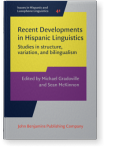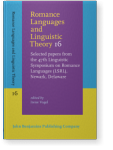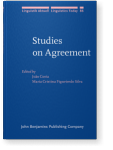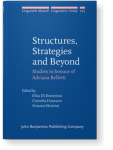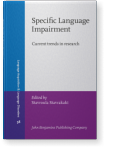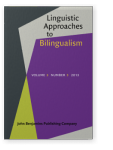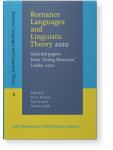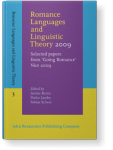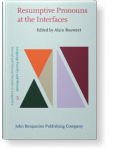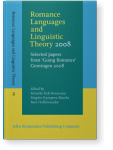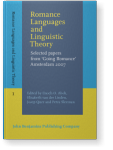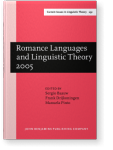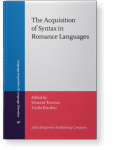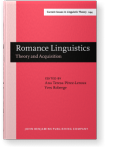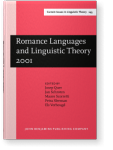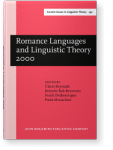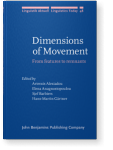João Costa
List of John Benjamins publications for which João Costa plays a role.
Book series
Title
Studies on Agreement
Edited by João Costa and Maria Cristina Figueiredo Silva
[Linguistik Aktuell/Linguistics Today, 86] 2006. vi, 285 pp.
Subjects Generative linguistics | Syntax | Theoretical linguistics
2015 A note on parallels between agreement and intervention Structures, Strategies and Beyond: Studies in honour of Adriana Belletti, Di Domenico, Elisa, Cornelia Hamann and Simona Matteini (eds.), pp. 83–96 | Article
This note explores the parallelisms between the constraints on syntactic agreement and the properties found in intervention configurations of the type studied in the literature on acquisition. It is argued that the similarities between them make it possible to hypothesize that one single syntactic… read more
2015 Null Subjects in Monolingual and Bilingual, Typical and Atypical Development: an exploratory study Specific Language Impairment: Current trends in research, Stavrakaki, Stavroula (ed.), pp. 175–190 | Article
We present an exploratory test on the production of null subjects by 13
monolinguals acquiring Capeverdean, 6 bilingual speakers of Capeverdean
and European Portuguese with typical language development and 7 bilingual
speakers with SLI features. Capeverdean does not allow null referential… read more
2013
2012 VP Ellipsis: New evidence from Capeverdean Romance Languages and Linguistic Theory 2010: Selected papers from 'Going Romance' Leiden 2010, Franco, Irene, Sara Lusini and Andrés Saab (eds.), pp. 155–176 | Article
Capeverdean, a Portuguese-based Creole language, displays an intriguing pattern of VP Ellipsis (VPE): VPE may occur in answers to yes/no questions but it is ruled out in coordination structures. This is unexpected, since both polar question/answer pairs and coordination structures are typical… read more
2011 Topic prominence is not a factor of variation between Brazilian and European Portuguese Romance Languages and Linguistic Theory 2009: Selected papers from 'Going Romance' Nice 2009, Berns, Janine, Haike Jacobs and Tobias Scheer (eds.), pp. 71–88 | Article
The existing syntactic differences between European and Brazilian Portuguese have received much attention in recent literature on generative syntax. According to several authors, Brazilian Portuguese became a discourse-oriented language with topic-prominence. This article shows that many… read more
2011 Last resort and no resort: Resumptive pronouns in Hebrew and Palestinian Arabic hearing impairment Resumptive Pronouns at the Interfaces, Rouveret, Alain (ed.), pp. 223–240 | Article
Whereas both Hebrew and Palestinian Arabic use resumption in object relatives, children with hearing impairment show completely different patterns of comprehension and production of object relatives in the two languages. This research compared the performance in the two languages, connecting the… read more
2010 Middle scrambling with deictic locatives in European Portuguese Romance Languages and Linguistic Theory 2008: Selected papers from 'Going Romance' Groningen 2008, Bok-Bennema, Reineke, Brigitte Kampers-Manhe and Bart Hollebrandse (eds.), pp. 59–76 | Article
This paper discusses the peculiar ability of certain deictic locatives (like lá ‘there’) to appear left-adjacent to the verb in European Portuguese. We propose that leftward movement of lá (and similar deictic locatives) is middle scrambling, understood as movement to Spec,TP. In order to explain… read more
2009 Hebrew and Arabic children going Romance: On the acquisition of word order in Semitic and Romance Romance Languages and Linguistic Theory: Selected papers from ‘Going Romance’ Amsterdam 2007, Aboh, Enoch O., Elisabeth van der Linden, Josep Quer and Petra Sleeman (eds.), pp. 51–66 | Article
In Hebrew, European-Portuguese, Spanish, and Palestinian-Arabic both SV and VS orders are possible. In the early stages of sentence construction, however, children acquiring these languages do not use the whole array of word orders in their language. Their word order preference differs in the… read more
2008 Focus at the interface: Evidence from Romance and Bantu The Bantu–Romance Connection: A comparative investigation of verbal agreement, DPs, and information structure, De Cat, Cécile and Katherine Demuth (eds.), pp. 293–322 | Article
Word order variation in Romance and Bantu has been related to information structure portrayed in the different discourse functions of the sentential elements involved. Based on the distribution of new information focus in Romance and Bantu, this paper argues that discourse functions need not be… read more
2007 Clitic omission, null objects or both in the acquisition of European Portuguese? Romance Languages and Linguistic Theory 2005: Selected papers from ‘Going Romance’, Utrecht, 8–10 December 2005, Baauw, Sergio, Frank Drijkoningen and Manuela Pinto (eds.), pp. 59–72 | Article
Previous studies have established a correlation between early clitic omission and the existence of past participle agreement, explainable with a maturational constraint – the UCC. Since Portuguese doesn’t show past participle agreement, it is expected that Portuguese children will produce clitics… read more
2006 Acquisition of focus marking in European Portuguese: Evidence for a unified approach to focus The Acquisition of Syntax in Romance Languages, Torrens, Vincent and Linda Escobar (eds.), pp. 319–329 | Article
This paper investigates whether children make the distinction between syntactic marking and prosodic marking of focus. The acquisition of focus marking provides a good testing ground to compare parametric and interface views on focus. If focus marking is parametric, children acquiring a language… read more
2006 Introduction Studies on Agreement, Costa, João and Maria Cristina Figueiredo Silva (eds.), pp. 1–9 | Miscellaneous
2006 Nominal and verbal agreement in Portuguese: An argument for Distributed Morphology Studies on Agreement, Costa, João and Maria Cristina Figueiredo Silva (eds.), pp. 25–46 | Article
2003 Weak Forms as Xo: Prenominal Possessives and Preverbal Adverbs in European Portuguese Romance Linguistics: Theory and Acquisition, Pérez-Leroux, Ana Teresa and Yves Roberge (eds.), pp. 95–110 | Article
2003 Null vs Overt Spec, TP in European Portuguese Romance Languages and Linguistic Theory 2001: Selected papers from 'Going Romance', Amsterdam, 6–8 December 2001, Quer, Josep, Jan Schroten, Mauro Scorretti, Petra Sleeman and Els Verheugd-Daatzelaar (eds.), pp. 31–47 | Article
2002 Multiple focus in European Portuguese: Apparent optionality and subject positions Romance Languages and Linguistic Theory 2000: Selected papers from ‘Going Romance’ 2000, Utrecht, 30 November–2 December, Beyssade, Claire, Reineke Bok-Bennema, Frank Drijkoningen and Paola Monachesi (eds.), pp. 93–108 | Article
2002 5. VOS in Portuguese: Arguments against an analysis in terms of remnant movement Dimensions of Movement: From features to remnants, Alexiadou, Artemis, Elena Anagnostopoulou, Sjef Barbiers and Hans-Martin Gärtner (eds.), pp. 69–89 | Chapter
2002 External subjects in two varieties of Portuguese: Evidence for a non-unified analysis Romance Languages and Linguistic Theory 2000: Selected papers from ‘Going Romance’ 2000, Utrecht, 30 November–2 December, Beyssade, Claire, Reineke Bok-Bennema, Frank Drijkoningen and Paola Monachesi (eds.), pp. 109–125 | Article
